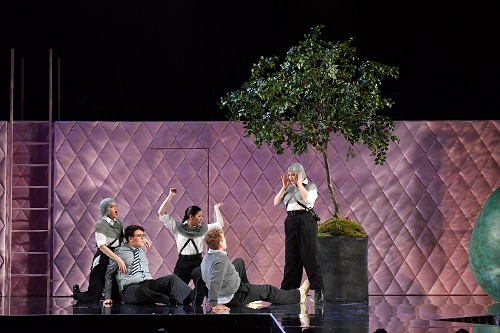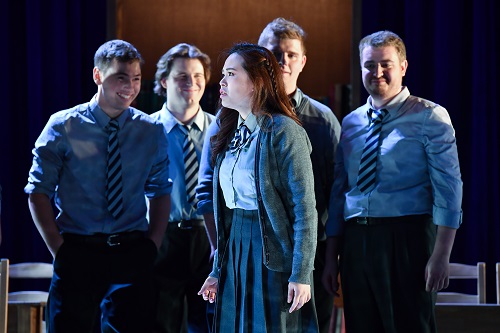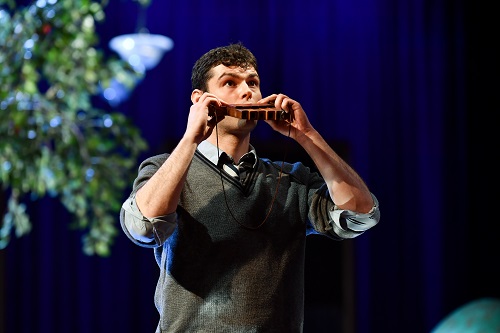At first glance, Polly Graham’s decision to set Mozart’s The Magic Flute in a secondary school seems an inspired one. After all, in Schikaneder’s journey from darkness to light the youths are very much at odds with their elders – adolescents struggling with love and loneliness, as they yearn and learn to ‘find themselves’.
So, in this new production at the Royal College of Music Papageno’s ‘bird-catching’ involves not the angling of avian apparatus but switching on a smartphone and swiping right. Sarastro’s ‘In diesen heil’gen Hallen’ is a pompous Headmaster’s homily to rebellious ranks of twitchy teenagers. There are no Temple Priests reciting the creeds of Isis and Osiris that lead to Enlightenment; rather, a scrum of self-righteous Schoolmasters claim they can guide their troubled young charges to Wisdom and Knowledge. The schooldays of the students at the Royal College of Music Opera Studio are not so far behind them and they relish the opportunity to don their blue blazers and grab their badge-blazoned rucksacks, resurrecting adolescent angst, moonstruck moping and pouting defiance with evident glee. The School Library is a charming reminder of schooldays of yore – wooden desks and stacks stuffed with books rather than IT suites and workstations – and designer Rosie Elnile serves up some neat visual gags too. Papageno’s magic chimes have morphed into a giant school bell that descends via the Britten Theatre rigging and rings with such charm that it transforms the bespectacled school swot into a beautiful Papagena. Think Grange Hill meets Ugly Betty.
Graham has a problem, though. What to do with the opera’s ‘fantasy’ in such a ‘realist’ setting? It’s hard to imagine the Queen of the Night popping up to deliver Morning Assembly, a playground populated with serpents and dancing animals, or a magic flute ringtone that will protect one through trials of fire and water. Parallels and transformations might be possible: Monostatos as School Bully, The Speaker as the Head’s Secretary, and the trials of the Temple of Ordeal reimagined as a private school ‘fresher week’ initiation rite, say. But, in the world of the Fantastic – which is surely where Schikaneder sites us – the possible and the impossible, the human and the mythical, are interwoven in a way which may seem to defy logic and consistent explanation but which is never questioned by those within that world.

Graham decides to get round the issue by creating two separate worlds: so, the banality of boarding school is juxtaposed with what Graham describes as a ‘subconscious dreamscape’. Inspired by an essay by the psychoanalyst Sabina Spielrein she professes to have ‘contrast[ed] the school space with a dream landscape where protagonists can explore their deepest desires and inner demons’. I’m not sure that I want to delve too deeply into adolescent desires and demons. But, here the dreamscape is represented by a tree – of Knowledge, one presumes, its branches festooned with red apples ripe for Eve’s picking – a rock and a giant green egg beside a pool from which a breast-plated Queen of the Night emerges, her knife glinting as darkly as her Three Ladies’ chainmail headdresses sparkle. To show us when we are entering the dream world a pink cushioned wall descends – a sort of huge upturned mattress – obscuring the Library beyond. Protagonists move between the two domains by scrambling up a book-stack ladder which is embedded in the wall. At times it looks as if they are trying to escape from the asylum.
The real and the fantastic are neither neatly juxtaposed nor convincingly fused. And, there are further problems which result from Graham’s intention to make Mozart’s flawed masterpiece ‘meaningful, relevant and alive’ to ‘contemporary eyes’ by reimagining the opera’s gender dynamics. Well, gender certainly is a tricky issue in The Magic Flute, the central duality of which, light and darkness, is a gender metaphor (admitting elements of class and race, too) by which the Queen (by implication all women), seemingly so noble and righteous at first, is revealed as the enemy of the true rational philosophy of the Enlightenment.
Seeking to challenge this socially constructed misogynous hierachy, Graham reimagines the Queen of the Night as a feminist revolutionary whose ‘incantatory force’ guides her daughter to self-realisation and victory over the patriarchy. This Queen of the Night is certainly not destined for eternal darkness. Her Three Ladies (or, here, Three Women) are thus feminist freedom fighters, and they make it quite clear what they think of the patriarchy, prompting a warning note about the production’s ‘strong language’. The ‘Three Junior Girls’ don’t just guide Tamino and Papageno to the ‘temple’ but tie up their teachers on route and subject them to ritual humiliation by lipstick. Released from bondage, one schoolmaster scrawls his sexist sentiments across the classroom blackboard: “Pamina is a bitch.” Sarastro is a sinister, lecherous Headmaster who, during the overture, makes a predatory assault on Pamina as she does her homework. Pamina herself is no angel: before she encounters the love-struck Tamino she takes a fancy to the school Lothario, Monostatos, and they disappear for a bonk behind the bike-sheds. It feels rather rough on Monostatos when he is punished for his ‘misdemeanours’ with the order to scribble lines on the blackboard for the entirety of the interval.

There’s a lot going on here, and while much is entertaining and thought-provoking, it doesn’t really add up. Moreover, the cuts to both score and spoken dialogue do further damage to the narrative. The stage action does not make the destination of Tamino’s ‘quest’, or the wherefore of the trial by fire and water, very clear; it’s not really evident that there is a ‘trial’ at all – the stage is simply bathed in red light for a moment or two. Often characters’ ‘doing’ and ‘singing’ are at odds or mismatched: even in the opening scenes the Three Women laud the “charming young man, tender and beautiful” whom they have saved from the Serpent (lascivious lecturers with snake-head masks, more interested in schoolgirls than Tamino), when there are in fact two young men prone before them – which lad is it who prompts the praise, ‘So beautiful a youth I have never seen before’? At times the surtitles tell a completely different tale to the events unfolding on stage. Elsewhere Graham just re-writes the translated text so that we read something completely different to the German that is actually being sung – hardly helpful to young singers learning to interpret these roles and sing with true expression of music and text. And, in an opera which aims to instil rational values in us all, the illogic is a problem at times.
Fortunately, those young singers make one forget some of the more nonsensical business. Ted Black displayed a strong, firm tenor, the warmth of which draws sympathy for Tamino’s plight. A little more flexibility of phrasing would have deepened Tamino’s vulnerability, although conductor Michael Rosewell didn’t offer the singers much opportunity for suppleness. Hyoyoung Kim took the role of Pamina with a vocal stylishness that overcame the paradoxes of the production’s characterisation. ‘Ach, ich fühl’s’ was beautifully poised and elegant, the melody shining with feeling, even if such suffering might have seemed hyperbolic on this occasion, stemming as it did from the silent treatment dished out by some spotty schoolboys. Clara Barbier Serrano was a fearless Queen of the Night, striding the stage with the pride of Boudicea and hitting the high notes with real punch. Her cut-glass soprano truly did gleam darkly. Harry Grigg was a surprisingly likeable Monostatos and Jamie Woollard’s terrifically sonorous bass, as deeply coloured as mahogany, swelled beautifully through ‘O Isis and Osiris’ and ‘In diesen heil’gen Hallen’, belying the menacing malevolence with which he was charged here.

The Three Women (Lylis O’Hara, Annabel Kennedy and Emma Roberts) glistened richly, Dafydd Allen was a confident Speaker, and the Three Junior Girls (Leah Redmond, Denira Coleman and Taryn Surratt) sang and acted with a convincing mix of coyness and cheek. Star of the show was Theo Perry’s Papageno who persuaded with every phrase he sang and whose assured baritone we are certainly going to hear a lot more of in the years ahead. This Papageno absolutely deserved his final happiness and Sofia Kirwan-Baez’s superbly acted Papagena was a just reward. After a leaden ‘knock at the door’ and some very wonky intonation in the overture, the Royal College if Music Opera Orchestra settled down and their playing became increasingly taut and focused as the evening progressed.
The Magic Flute undoubtedly has its flaws, and Graham has been both brave and imaginative in challenging the hierarchical social organisation that the opera seems to espouse and which troubles us today. The problem is that the opera only really ‘works’ if we are prepared to accept that, within the world of the opera rather than our own, Sarastros’ ideology is the morally superior one. Moreover, that ideology is not entirely formed from a rational, secular worldview but, rich in symbol and allusion, integrates the mythological too. The secular and mythological are inextricably fused, so when Pamina accepts her role within the hierarchy, she too is accepted into the benevolent temple. Thus, harmony on heaven and earth is restored. Meddle with the light and the darkness at your peril …
Claire Seymour
Tamino – Ted Black, Pamina – Hyoyoung Kim, Sarastro – Jamie Woollard, Queen of the Night – Clara Barbier Serrano, Theo Perry – Papageno, Three Ladies – Lylis O’Hara/Annabel Kennedy/ Emma Roberts, Three Junior Girls – Leah Redmond/Denira Coleman/Taryn Surratt, Monostatos – Harry Grigg, Speaker – Dafydd Allen, Papagena – Sofia Kirwan-Baez, First Teacher – Henry Wright, Second Teacher – Sam Harris, First Boy – Daniel Gray Bell, Second Boy – Redmond Saunders, Chorus (Madeline Boreham, Angelina Dorlin-Barlow, Matthew Curtis, Sam Hird; Director – Polly Graham, Associate Director – Louise Bakker, Conductor – Michael Rosewell, Designer – Rosie Einile, Co-Designer – Hazel Low, Lighting Designer – Tim Mitchell, Kate Flatt – Movement Director, Royal College of Music Opera Orchestra.
Britten Theatre, Royal College of Music, London; Monday 22nd November 2021.